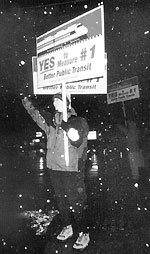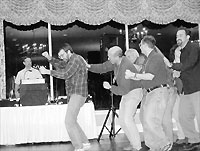|
|
By Nick Cain
When it comes to sprawl, the obvious headline - "Developers Defeat
Initiatives" - is not the right one. Though two high-profile smart-growth
ballot initiatives backed by the Sierra Club met defeat in Arizona
and Colorado, the electoral news is, on the whole, very positive.
More than 80 percent of state and local open-space initiatives passed
in November, and voters across the country earmarked more than $7
billion to protect open space.
 |
 |
| Bearing it Here, Baring it There: Snow flurries
didn't keep Sierra Student Coalition member Rebecca Cicconi away
from a rally to support public transit in Salt Lake City, Utah.
Under sunnier skies, Sierra Club activists in Washington, D.C.,
joined a coalition that used the postcard above to push for expanded
Metro service. |
Not only did smart growth triumph at the ballot box, but, with the
help of Sierra Club field activists and volunteers, public transportation
got a boost in several unlikely locations, a slew of massive sprawl-creating
malls were stopped dead in their tracks and sprawl activists learned
how to be even more effective.
Critics of smart growth often claim that voters may support open
space, but they won't pay for it. This year's election results soundly
disprove this claim. "Clearly, people are willing to invest their
tax money to protect parks, farms, forests and fields," said Land
Trust Alliance Public Policy Director Russ Shay.
Also, despite Utah's reputation as a state more suited to four-wheel
drives than trains, County Measure 1 passed with flying colors. Not
only does the measure add four new lines to Salt Lake City's current
light-rail system and establish a new commuter-rail service from Ogden
to Provo, it raises the sales tax by a quarter of a cent. These achievements
show that Americans are willing to spend on sensible smart-growth
measures like public transportation.
And Salt Lake is not alone: Houston's city council recently decided
to give light rail a chance by agreeing to build a 7.3-mile line.
And even the granddaddy of sprawl, Los Angeles, has expanded its public
transportation options by adding express buses and expanded subway
service over the past year.
Club organizer Marc Heileson in Utah described the growing support
for public transportation in the West as a "snowball of smart growth."
But it's a tribute to Sierra Club smart-growth activists that something
once thought to have little more than a snowball's chance in hell
is now rolling down the street.
 |
Sprawlfighter Samba: Sprawl is a serious
issue, of course, but talking about it doesn't have to be. At
a December planning session in Virginia, members of the Challenge
to Sprawl Campaign Committee danced their message for the audience.
Showing off their sprawl-busting spirit are, left to right,
volunteers and staffers Ben Hitchings of NC, Glen Besa of VA,
John Holzclaw of CA, Peter Tyler of TX and Nick Cain of the
Club's media team.
|
Another positive trend: Communities are finally wising up to the
harm caused by mega-malls. Some cities, like Cincinnati, have even
begun to say no to sprawl-as-usual and are pushing zoning boards and
elected officials to plan more intelligently. Sierra Club activists
in Southwestern Ohio actually managed to stop not one, but two poorly
planned malls over this past year. "The citizens of Ohio, and the
United States, are tired of seeing precious open spaces disappear,"
said Club organizer Glen Brand. "More and more of them are becoming
involved in our efforts to make growth smarter."
Activists are learning to fight smarter at training workshops around the country. In early November, volunteers from across the Southern Plains got together in Norman, Okla., for a day of intensive training on the causes of sprawl - and the best strategies to fight it. "Getting training on how to fight sprawl is essential," said Mike Opitz, conservation chair of the Oklahoma Chapter, "but brainstorming and comparing notes are just as important. The great thing about the November training is we got to do both."
This year also marked a campaign milestone: the release of two national reports on suburban sprawl. By building on almost a dozen local "Sprawl Costs Us All" reports, the campaign created a national survey showing how taxes fuel poorly planned development. Among the findings: It actually costs taxpayers more to develop open space into housing than to protect the land as open space.
The fall report, "Smart Choices or Sprawling Growth," gave specific examples of good and bad development in every state and the District of Columbia.
For those who missed out, copies of this year's sprawl reports are available online at: www.sierraclub.org/sprawl
.
Americans are beginning to realize that if they get involved and make their voices heard, they can stop out-of-control development, build better neighborhoods and protect open space - for our families and for future generations.
Up to Top
|